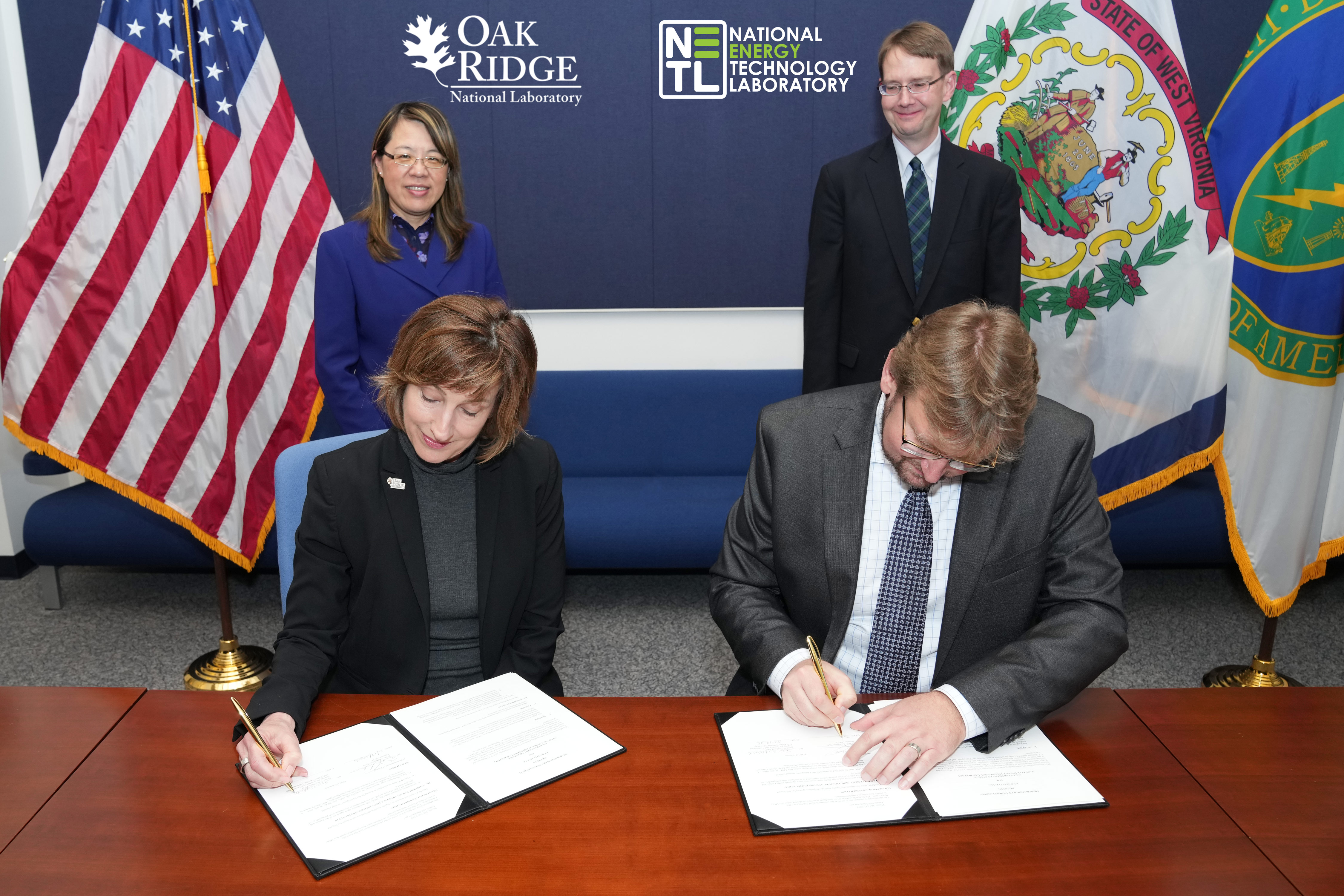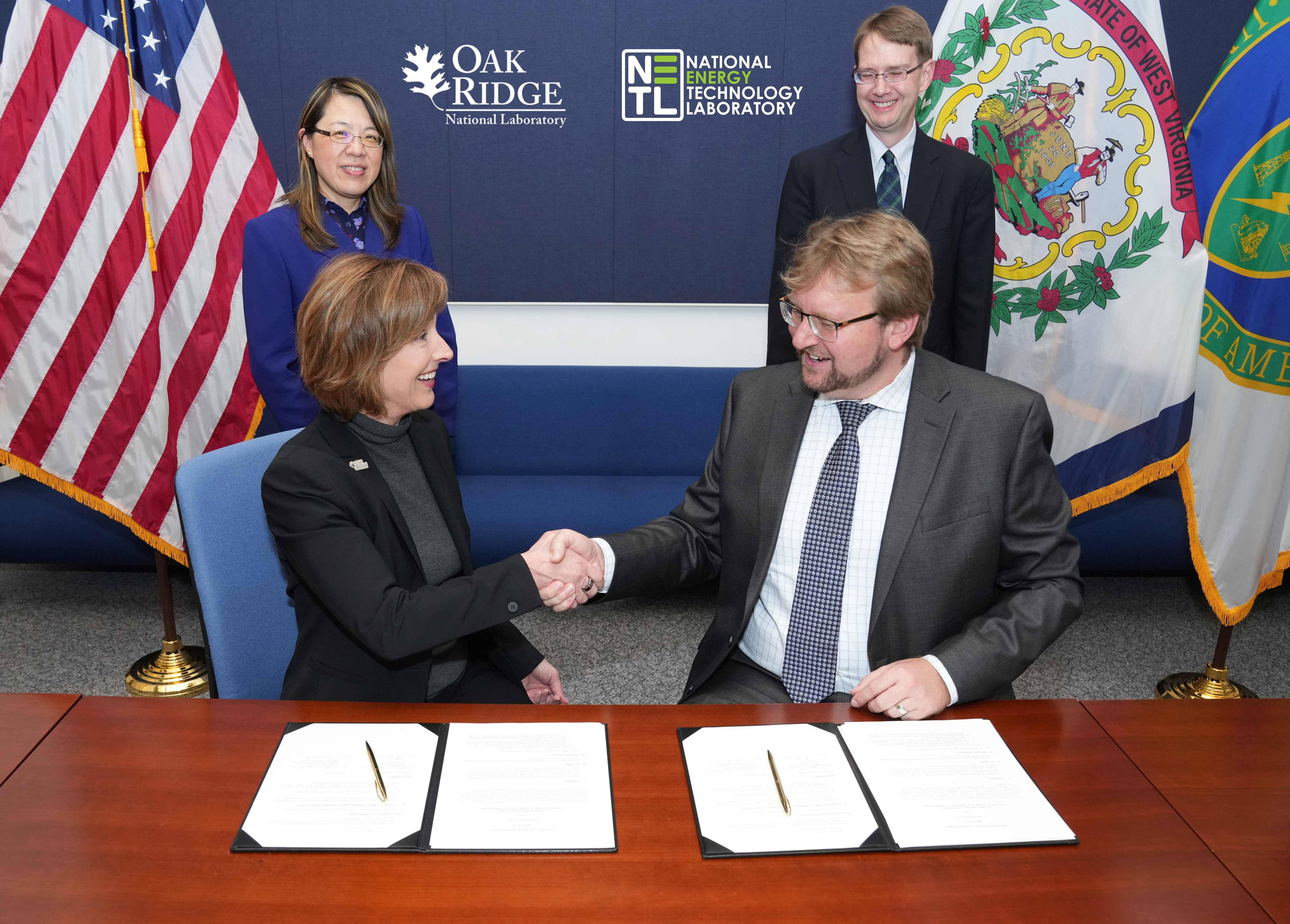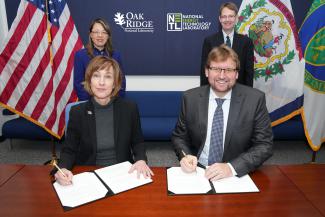NETL is teaming with Oak Ridge National Laboratory (ORNL) to jointly explore a range of technology innovations for carbon management and strategies for economic development and sustainable energy transitions in the Appalachian region.
 NETL Director Brian Anderson, Ph.D., and ORNL Deputy Director for Science and Technology Susan S. Hubbard, Ph.D., signed an official memorandum of understanding during a brief ceremony held at NETL’s Morgantown, West Virginia, site Friday, March 17.
NETL Director Brian Anderson, Ph.D., and ORNL Deputy Director for Science and Technology Susan S. Hubbard, Ph.D., signed an official memorandum of understanding during a brief ceremony held at NETL’s Morgantown, West Virginia, site Friday, March 17.
Anderson explained that the purpose of the new agreement is to establish cooperative efforts in the areas of carbon management including carbon dioxide removal; critical minerals; industrial emissions; clean energy technologies including smart manufacturing; digital manufacturing technologies and advanced data analytics; and energy transition in the Appalachian region.
Established in 1943, ORNL is the largest science and energy national laboratory in the DOE system by size and third largest by annual budget. Its scientific programs focus on materials, nuclear science, neutron science, energy, high-performance computing, systems biology and national security, sometimes in partnership with the state of Tennessee, universities and other industries.
NETL is DOE’s national laboratory that focuses on carbon management and resource sustainability. Its research portfolio includes carbon capture, transport and storage, carbon dioxide removal and conversion, hydrogen and reversible solid oxide fuel cells, critical minerals and rare earth elements, water management, and methane mitigation. NETL leads major initiatives in collaboration with other national laboratories and universities. Key capabilities at the lab include the Advanced Alloys Signature Center, the Science-Based Artificial Intelligence and Machine Learning Institute (SAMI), the Institute for the Design of Advanced Energy Systems (IDAES), the Center for Microwave Chemistry, and the recently announced Direct Air Capture Test Center.
Under the new agreement, NETL and ORNL intend to jointly explore:
- Development and demonstration of materials and technologies for carbon capture and utilization, in particular direct air capture.
- Development of best practices for carbon dioxide removal, including measurement, reporting, and verification, and advanced data analytics to develop technologies and practices focusing on information, automation, monitoring, computation, sensing, modeling, and networking.
- Research, development, demonstration, and commercialization of sustainable technologies for production, extraction, separation and use of critical minerals, to ensure long-term secure and sustainable domestic supply chains.
- Creation of alternative uses of coal, including use as a precursor for manufacturing high value-added products.
- Development of technologies, including clean advanced manufacturing technologies with emphasis on those that can enable the decarbonization of the energy, industrial, transportation and buildings sectors. Areas of interest include, but are not limited to, additive manufacturing, smart manufacturing, digital manufacturing, and advanced data analytics to develop advanced technologies and practices in sensing, automation, monitoring, computation, modeling, process integration and intensification, and process scale-up.
- Development and implementation of strategies to enable economic development and sustainable energy transitions in the Appalachian region.
 UT-Battelle manages ORNL for the Department of Energy’s Office of Science, the single largest supporter of basic research in the physical sciences in the United States. The Office of Science is working to address some of the most pressing challenges of our time. For more information, please visit energy.gov/science.
UT-Battelle manages ORNL for the Department of Energy’s Office of Science, the single largest supporter of basic research in the physical sciences in the United States. The Office of Science is working to address some of the most pressing challenges of our time. For more information, please visit energy.gov/science.
NETL is a DOE national laboratory that drives innovation and delivers technological solutions for an environmentally sustainable and prosperous energy future. By using its world-class talent and research facilities, NETL is ensuring affordable, abundant and reliable energy that drives a robust economy and national security, while developing technologies to manage carbon across the full life cycle, enabling environmental sustainability for all Americans.





 NETL Director Brian Anderson, Ph.D., and ORNL Deputy Director for Science and Technology Susan S. Hubbard, Ph.D., signed an official memorandum of understanding during a brief ceremony held at NETL’s Morgantown, West Virginia, site Friday, March 17.
NETL Director Brian Anderson, Ph.D., and ORNL Deputy Director for Science and Technology Susan S. Hubbard, Ph.D., signed an official memorandum of understanding during a brief ceremony held at NETL’s Morgantown, West Virginia, site Friday, March 17. UT-Battelle manages ORNL for the Department of Energy’s Office of Science, the single largest supporter of basic research in the physical sciences in the United States. The Office of Science is working to address some of the most pressing challenges of our time. For more information, please visit
UT-Battelle manages ORNL for the Department of Energy’s Office of Science, the single largest supporter of basic research in the physical sciences in the United States. The Office of Science is working to address some of the most pressing challenges of our time. For more information, please visit